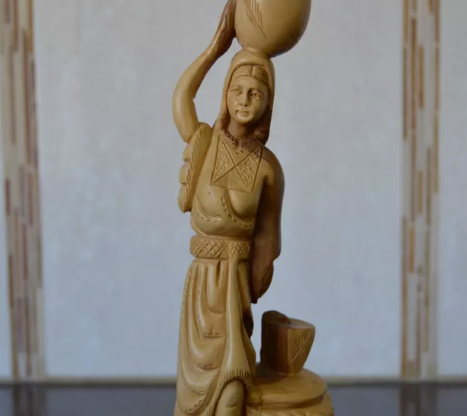On the last day of the Messy Church conference in Canada, we heard this story from Neil Mancor, who is minister of the Anglican Parish of St George, Ste Anne-de-Bellevue, QC. Neil is also Regional Coordinator for Messy Church in Quebec, Ottawa, Maritimes.
As much fun as we all have, and Messy Church is a lot of fun, discipleship is a serious business. Messy Church is serious in its intent to make disciples. Making disciples is costly, time-consuming and essential. It is also rewarding and rich beyond words: there is no excitement quite like it. To hear someone come to Messy Church and say: ‘So this is church; this is my church’ is what we live for. When I think of Messy Church discipleship, I think of the story of Goldilocks and the three bears – who, when she came upon the bears’ porridge, found one bowl to be too hot, the next one too cold and the third one just right.
One criticism of Messy Church discipleship is that it is too hot: too much Bible; the stories are too hard; too much Jesus. We don’t want to put people off; we must not impose our views on them. I’ve talked to some people who were thinking about Messy Church but they were not really convinced about the gospel themselves. I know of a café church that started off well; they had it all organised and started with that discipleship focus, that Jesus focus that welcomed others to explore faith. But they did not want to offend: we don’t want to force our faith on others, we mustn’t come on too strong too soon… and bit by bit, that focus shifted away and now they still meet but have a series of speakers on diverse subjects as local architecture, laughter yoga and non-violent communication. All of those may be worthy topics, but this is not the gospel and it is not discipleship. There is a place for outreach events that do not have a specific spiritual focus, but that is not Messy Church. As a culture and as a people, sometimes we fall into a state of being ashamed of the gospel. The apostle Paul says, ‘I am not ashamed of the gospel, because it is the power of God that brings salvation to everyone who believes’ (Romans 1:16, NIV). Let’s not be ashamed of the gospel but inspired by the gospel to share Jesus Christ in every part of Messy Church.
The other criticism is that Messy Church discipleship is too cold; there are lines of critique out there horrified that we call this ‘church’; that we say it is a suitable alternative to Sunday morning church; our expectations are too low for people. You’ve watered the Bible down, where is the Bible teaching; you need to move faster. You call this church when there are no sacraments: there’s no liturgy; when are these people going to show up in church on Sunday and help us pay the bills; ah ha – that’s it, isn’t it? I actually think Messy Church is deeply informed by tradition: it includes prayer; the Bible is taught; our feast together always feels to me like the Messianic banquet. Now, we could have a fun craft time and meal but not attend to the teaching part or, out of a fear of offending, we could water it down, make it simplistic, basic. If we do that, yes, we are too cold in our disciple-making. I find the Get Messy! material constantly challenging and there is nothing watered down. It is unpacked in a way people can grasp and think about. Often, I find I gain wonderful new insights in telling the story in a different way. But still we tell the story. We do not want to reduce Messy Church teaching down to the lowest common denominator so that the gospel loses its power. If you did the theme in September 2017 (A Holy Temple from Ephesians 2:19-22), there was powerful teaching throughout. We included the prayer wall activity: truly the prayers of the people of all ages. At celebration, we sang our songs and told the story and prayed: Jesus be the cornerstone of our Messy Church; be the cornerstone of my life. Everyone held on to a block as they prayed, and then we built our temple together. I think that is as powerful a moment as any there is. It is as powerful as an altar call at an evangelistic event. It’s Messy-Church style.
Too hot, too cold, just right. That is what Messy Church is about: its evangelism and discipleship for our time now. As I thought about Messy Church discipleship, I began to reflect upon my own journey towards faith in Jesus Christ, a journey which, of course, takes a lifetime. What are the similarities and differences between how I came to faith and how Messy Church brings people to faith? The image I came up with is a long chain, one link after another.
My testimony
I grew up in Vancouver, studied in the UK and now serve in Montreal. I was raised in an Anglican household and I am profoundly grateful for my upbringing. We went to church every Sunday, mainly because I joined the junior choir and we had to. Out of that upbringing, I received a love of liturgy and our church was a warm community. I learned to love the people of God from a young age. But we never talked about Jesus. If you scratched just below the surface and asked, we might say: I go to church but I’m not religious. It was okay to talk about God, but to mention Jesus made us cringe with embarrassment. People who talked about Jesus were weird. Yet in our family we all, in our different ways, came to spiritual awakening over a period of time in the 1980s: my mother started watching 100 Huntley Street in the morning. Through the TV, for me, was modeled a gracious, loving Christ-likeness that I found attractive, compelling. What did they have that we lacked?
I was bullied at school and, in the end, my parents sent me to a private Christian School, where I encountered a very different kind of churchgoer: they were Christians; they called themselves Christian. Instead of bullying me at recess, the Pentecostal kids would try to lay hands on me for the infilling of the Holy Spirit. They had a different take on faith: they seemed to love Jesus; to know Jesus; they prayed for things and expected that God would answer. They brought their Bible with them everywhere and they weren’t just a King James. Someone invited us to hear a speaker who came into town: an evangelist. We went. And heard – heard about Jesus Christ and about our need for him.
As time went by and I was in my mid-teens I grasped something was missing: yes, I went to church and yes, I loved the liturgy; but I did not know or love Jesus. In the language of the time, I was not born again; my spirit had not been quickened. But, through the example of others and hearing evangelists, I defined what was lacking: I had not committed my life to Jesus Christ; he was not my Lord and Saviour. Yes, I wanted to do that. I was 17 at an evangelistic event for young people and the offer was made; the prayer was prayed and I prayed along with it. I am so glad that someone did that for me, because I did not know how to pray and I did not know what to say. I was led to faith and I knew, something had changed. Life has never looked the same.
About a year later, I was at another evangelistic event, hearing a speaker who happened to be John Stott and, at the lunch afterwards, I sat next to someone who seemed to me to be a rather old man, who it turns out to have been J. I. Packer. He zeroed right in on that 18-year-old and I have never forgotten our conversation, which encouraged me to keep in the faith and stay focused on Jesus Christ. How wonderful to have been discipled by J. I. Packer! There were many others. I moved to England to study when I was 22 and met many wonderful Christians who impacted my faith by who they were or what said or taught. (Lucy and I think we really must have met sometime in 90s, but we’re too old to remember when and where!) But you can see the links in the chain which led me to that decision to put my faith in Jesus Christ and which have kept me on that journey ever since. Faith did not come in one moment, but in many moments. There are 1,000 links in that chain: a whole community of people who introduced me to Jesus Christ, who kept me on that journey.
At its best, Messy Church does all of that, but for our age now. What is similar: the journey towards faith in Jesus Christ is a long one. It is a journey which every person needs to make for themselves and they need helpers along the way. They need people to come alongside and model Christian discipleship in their lives, their actions and their words. They need to have conversations with committed Christians that help them move towards Christ. They need to hear the stories of our faith and hear about Jesus. Messy Church brings all of that together in place at one time.
But there is a key difference: I grew up in a Christian environment: not religious(!), but we went to church. I grew up in a Christian culture: the stories, the symbols and rituals, the music. I don’t need to tell you that things are very different now. We cannot expect people to know anything about church, the Bible, being a disciple or Jesus Christ. We can lament all we like, but Sunday worship just does not work for most people now. In the Quebec context in which I live, the rejection of the church has been profound: many still identify as Catholic, but they will quickly tell you: no one goes to church in Quebec. The very word ‘Église’ is loaded for Quebecois people. The power of Messy Church is to re-present Christ, the Christian faith and church to a new generation that know nothing about this.
Two discipleship principles I think apply to me
1 We walk the talk
Or, to put it another way: we must add many extra links to the chain. We unpack the scriptures more: much more than many of us may be accustomed to. We unpack the gospel more for a people who have never heard of it. We introduce Jesus Christ to those who do not know him. That takes time. It means we are willing to extend ourselves much, much further and to unpack everything that much more. It takes much more time than we may be accustomed to. Yet still we take the time and make the effort.
I liken being a lifelong Christian in a tradition and heritage to living in the Penthouse suite of a skyscraper. We know our traditions, our institutional language from our hearts: Anglican, United Church, Pentecostal Presbyterian, whatever it is, we all know our institutional characteristics. Messy Church says we are willing to extend ourselves way beyond our inherited tradition; we are willing to reach right down to the ground and unpack the gospel so it can be understood; we lose the terminology of our institutions and say: you are worth the effort.
Yet is our work any less impactful for that? I think not. Is our focus any less clear? No. For unpacked does not mean diluted. Simple does not mean simplistic. Not a watered-down gospel: an unpacked gospel, a lived gospel, bringing Jesus Christ to those who do not know him. But if we are willing to reach that far, we need to remember to reach equally far the other way too…
2 The aim is still the same
The aim of Messy Discipleship is to lead people to faith in Jesus Christ: to make disciples. This is why we do this work. In this very simple truth lies the prophetic voice of Messy Church to the wider church. We are not here to make Anglicans. We are not here to build up our Sunday morning congregation. So often in our churches we are so preoccupied with attracting people to our inherited traditional services that we forget the true work of disciple-making. Why then do we do this work? We do this to make disciples among those for whom traditional church is not possible anymore. We do this because we so passionately believe that Jesus Christ is the life of the world that we are willing to take the time and make the effort. The aim of doing the time-consuming, messy work of disciple-making is the heart of Messy Church. We do not rob the gospel of its power, nor do we lose sight of the goal, which is to form disciples of Jesus Christ. When we lose sight of that, we become a craft group, a community outreach, an easy meal on a busy night. That is not our purpose: we preach the gospel. As Paul said in 1 Corinthians 1:17 (NIV) ‘For Christ did not send me to baptise, but to preach the gospel – not with wisdom and eloquence, lest the cross of Christ be emptied of its power.’ That’s right, isn’t it? That’s Messy Church! There is a place for the great sermon and the splendour of the organ – but that’s not Messy Church. Our desire is to lead people to Jesus Christ so that they can get to know him for themselves. So we come to them: we take the time, we make the effort and we provide the place. God does the work.
Let us not forget the goal of our work, the reason we do what we do, our passion and desire. The beginning and the end of Messy Church is the one who is himself the Alpha and the Omega: Jesus Christ. Keep that in mind and you have Messy Church discipleship: not too hot, not too cold: just right.
Why not think about the chain events, people, conversations, moments that led you toward faith in Jesus Christ and kept you on the journey of faith?
You may also like

Woman at the Well
3rd Nov 2024
Seaside Sojourn
21st Oct 2024It seems that I always get booked to deliver in-person training at seaside locations. This trend continued last weekend, as I headed off to the coastal village of Seaton, Devon.

Our Survey Said…
7th Oct 2024Back in February 2024, Church of England kindly sponsored a survey, completed by 330 Messy Church leaders. This is what we...

Storytelling from within God’s Story.
10th Sep 2024Hi Messy Friends! My name is Andrew McDonough. I live in Australia, draw sheep and tell stories. It began long long ago w...

